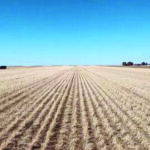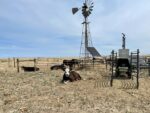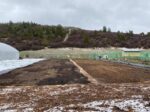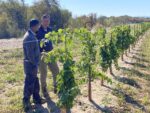Showing 41-50 of 50 results
 western.sare.org news experimenting-with-kernza
western.sare.org news experimenting-with-kernza Experimenting with Kernza
While some growers and researchers are experimenting with drought-adapted varieties of existing crops, others are testing more substantial shifts in agricultural practices. One of those shifts is from annual grain crops that have to be replanted every year to perennial grains that produce a crop year after year without replanting. In eastern Wyoming, a Western […]
 western.sare.org news switching-to-winter-crops-might-help-farmers-cope-with-warming-world
western.sare.org news switching-to-winter-crops-might-help-farmers-cope-with-warming-world Switching to Winter Crops Might Help Farmers Cope with Warming World
For people who grow food and cultivate the land, climate change isn’t something experienced though charts, graphs and predictions of foreboding futures. For growers, the threat of a warming world is immediate and increasing. “Climate change is playing out on farms like mine every day, every season and in every extreme weather event,” said Caitlin […]
 western.sare.org news reducing-weeds-by-80-using-solarization
western.sare.org news reducing-weeds-by-80-using-solarization Reducing Weeds by 80% Using Solarization
La Buena Tierra farmer Maria de los Angeles Carrillo (Angeles) is delighted that her interest in researching a non-chemical pest management practice has reduced her weeds by 80%. Coquillo (nutgrass) was the exception and even that stubborn grass has been reduced greatly and grows weaker roots. Lab tests also demonstrated reduced Verticillium wilt in the […]
 western.sare.org news the-quest-create-low-emission-cattle
western.sare.org news the-quest-create-low-emission-cattle The Quest: Create Low-Emission Cattle
As cows digest grasses and other cellulose-rich plants, microbes in their large first stomach – the rumen –break down the feed, releasing the potent greenhouse gas methane as a natural fermentation byproduct. Research is ongoing into seaweed and other additives to traditional forages to reduce methane production, creating low-emission feeds. But what if you created […]
 western.sare.org news farmers-test-benefits-of-using-hemp-stalks-to-produce-mushrooms
western.sare.org news farmers-test-benefits-of-using-hemp-stalks-to-produce-mushrooms Farmers Test Benefits of Using Hemp Stalks to Produce Mushrooms
When optimists are buried in proverbial lemons, they make lemonade. When the women who own Intentional Growth Farm in Utah had too many hemp stalks, they produced exceptionally large, tasty mushrooms. “We used the hemp stalks as the nutrient source for our oyster mushrooms, and customers said they were the best mushrooms they ever tasted,” […]
 western.sare.org news playing-pest-friends
western.sare.org news playing-pest-friends Playing Pest Friends
At their annual meeting this summer, Western SARE state coordinators came together and played an educational board game about managing pests. Their experience was similar to other groups who indicate that they learn more by doing than listening. Jason Thomas and Grant Loomis, extension educators at the University of Idaho, received a Western SARE grant […]
 western.sare.org news farmers-test-whether-cardboard-can-keep-bindweed-at-bay
western.sare.org news farmers-test-whether-cardboard-can-keep-bindweed-at-bay Farmers Test Whether Cardboard Can Keep Bindweed at Bay
Bindweed can be the bane of farmers’ existence. The climbing vine spreads easily by seed and rigorous root system, choking off crops and other plants along the way. “Even when we till in the spring, we spend a huge amount of time hand weeding throughout the season to manage bindweed,” explained Jonah Sloven, who grows […]
 western.sare.org news reasons-to-like-wine
western.sare.org news reasons-to-like-wine Reasons to Like Wine
Reasons to like wine Number 462: It can be good for New Mexico’s native bees and other pollinators. Even though grapevines are largely self pollinating and don’t need insects like bees or butterflies to produce fruit, vineyards themselves can provide habitat for native pollinators and other insect species, benefiting both the grower and the environment. […]
Video: Testing Cover Crops in New Mexico Vineyards
Watch our newest video describing this Western SARE funded work - Miranda Kersten, IPM Program and Gill Giese, Viticulture of New Mexico State University describe their work promoting putting cover crops in vineyards. The research will demonstrate how to ensure the cover crops successfully grow and flower so that they attract pollinators and provide additional […]
 western.sare.org news cheatgrass-eating-sheep
western.sare.org news cheatgrass-eating-sheep Cheatgrass-Eating Sheep
Wildfires in the West are inevitable and part of a natural, necessary ecological cycle, but invasive grasses like cheatgrass can make fires burn hotter, spread farther and cause more destruction. So, across the West, researchers, range managers, cattle ranchers and others are looking for ways to economically control cheatgrass and other invasive grasses on millions […]